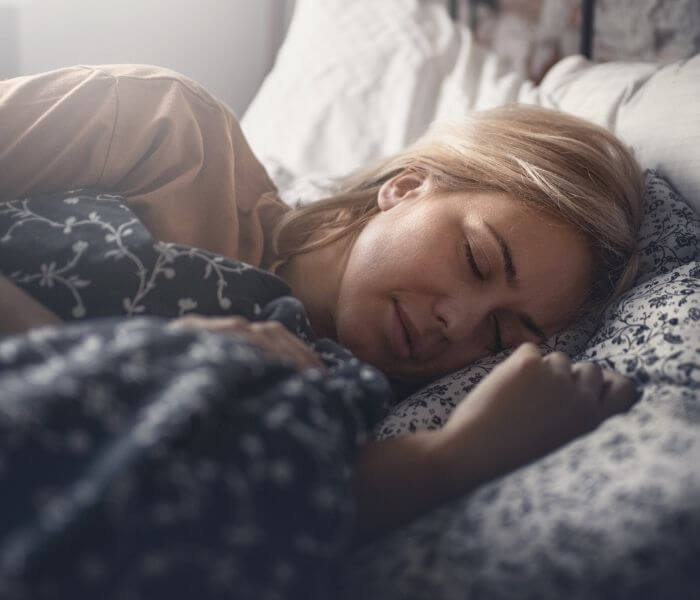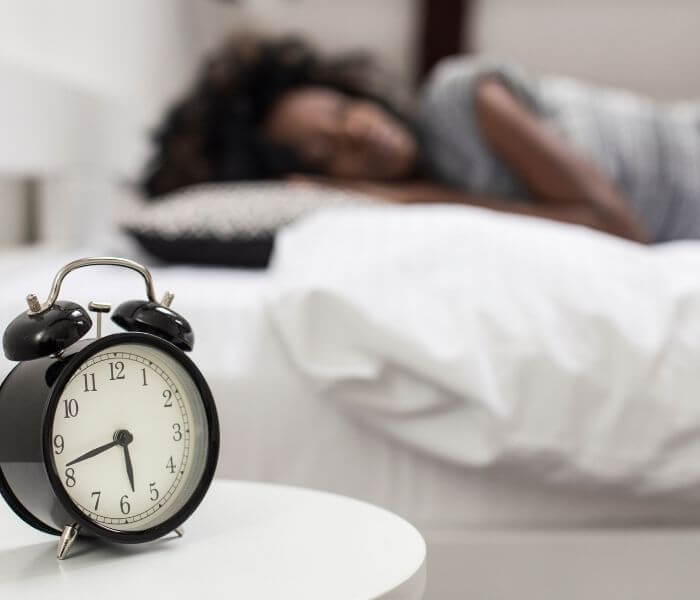7 mins read
Why Is Sleep So Important To Our Health?

- Why Do We Sleep?
- What Happens When We Are Asleep?
- What Happens When We Don’t Get Enough Sleep?
- Weight gain
- Diabetes
- Mental wellbeing
- Heart disease
Diet and exercise are hailed as the gold standards for a healthy lifestyle but there is one factor that is often overlooked. Sleep.
There is a growing trend emerging in both adults and children that less sleep is admirable [1]. The problem is sleep has a huge impact on our overall physical and mental health.
In his book, Why We Sleep: The New Science of Sleep and Dreams, Matthew Walker states that the “silent sleep loss epidemic is the greatest public health challenge we face in the twenty-first century in developed nations.” Of course, in 2017 he couldn’t have foreseen the COVID-19 pandemic we have since been learning to defend ourselves against, but it’s an interesting and casing point.
Why Do We Sleep?
It’s not an understatement to say sleep is necessary for survival. It is an essential function that enables the body to recover from the day and carry out key processes such as the production of growth hormone and the two control hormones – follicular stimulating hormone and luteinising hormone – essential for maintaining optimal body composition as well as reproductive health.
Sleep also enables the brain to store new information, supports brain function, and allows the body to repair cells, and restore energy. In addition, research has shown strong evidence that sleep enhances the immune system. Sleep and our immune system have a bidirectional relationship. Suffering a viral infection, such as flu, can make us feel tired, yet when we have consistent, good quality sleep it helps to balance our immune system. This in turn helps us fight off infections better – this why we may suffer more illness when we have less sleep.
The ability and desire to sleep are largely governed by the circadian rhythm, 24-hour biological cycles which influence many aspects of life including sleep. The circadian rhythm consists of a series of clocks as well as a master clock called the suprachiasmatic nucleus (SCN) [2].
The circadian rhythm is influenced by external factors such as light and dark as well as hormones. These factors help to signal to your brain to either get the body ready for sleep or to keep it alert and awake. These signals can also disrupt your circadian rhythm. For example, exposure to blue light sources like mobile phones and television screens before bed can trick your brain into thinking it’s still daytime by altering hormone levels and affecting sleep patterns [3].

What Happens When We Are Asleep?
Ultimately, what makes you fall asleep is an increase in melatonin. Its production increases as night falls, encouraging sleep and helping to keep the circadian rhythm in check. Melatonin is a hormone that is naturally produced by the pineal gland located in the brain and released into the bloodstream. When darkness begins to set in, the pineal gland is stimulated to produce melatonin. However, light stops its production and so, the hormone helps to regulate the circadian rhythm and provide the synchronicity between the sleep-wake cycle and night and day.
There are four stages of sleep, made up of three stages of non-rapid eye movement (REM) sleep and one REM sleep stage.
- Stage 1 (non-REM) – a light sleep where your heart rate, breathing rate and brain waves slow down. Essentially, a dozing off stage where your brain activity slows but can be awoken easily.
- Stage 2 (non-REM) – a light sleep where your eye movements stop, muscles and heart rate relax, and your body temperature cools. Stage 2 lasts, on average, between 10 and 25 minutes but can be longer as the night progresses. Most of the time asleep is spent in this stage.
- Stage 3 (non-REM) – deep sleep. Further decrease in heart and breathing rates, no eye movements and brain activity slows further. It’s believed to be a restorative stage where cells, tissues and muscles are repaired, and energy levels are restored.
- Stage 4 (REM) – occurs around 1.5 hours into falling asleep and there’s an increase in brain activity. Muscle paralysis occurs except for those in control of the eyes and heart. Eye movements increase and the stage is known for vivid dreams but is also vital for creativity [4], memory and learning.
What Happens When We Don’t Get Enough Sleep?
Poor sleep is bad for your health. Most people are aware of the acute changes a lack of sleep causes to our wellbeing like a low or bad mood and working less effectively, but it has a detrimental effect on physical health, too.
There is a whole array of factors that can affect sleep. Stress is a major contributor. According to university students, 64.8% blamed stress for poor sleep [5]. Other factors that can affect sleep, include:
- Ageing
- Hormones
- Blue light exposure
- Night or shift patterns
- Chronic pain
- Poor sleep hygiene
Immune system
Not getting enough sleep affects your immune system, making your body more prone to illness and infections. It increases the production of pro-inflammatory signalling molecules which induces chronic low-grade inflammation, and this increases the risk of developing long-term illnesses [6].
Weight gain
A lack of sleep is associated with weight gain. In fact, research has shown that people who sleep for less than 7 hours are at a greater risk of obesity [7]. That’s because sleep deprivation is linked with the dysregulation of the hormones, leptin and ghrelin which play a role in energy balance and appetite [8].
Diabetes
People who do not get a good night’s sleep on a regular basis are at an increased risk of developing type 2 diabetes. Studies show that men who get less than 6 hours of sleep at night are twice as likely to develop the condition as those who get at least 8 hours. That’s because it causes glucose intolerance and insulin resistance causing blood sugar levels to rise [10].
Mental wellbeing
Sleep is the ideal time for your brain to refresh itself. A lack of sleep can cause irritability and low mood in the short term. However, in the long term it can trigger disorders like anxiety and depression. Research shows that sleep disturbances occur in 80% of depression patients [9].
Heart disease
Poor sleep is also a risk factor for strokes and developing heart disease. A study conducted in Wales found that men who were consistently experiencing poor or disturbed sleep were at an increased risk of a stroke. Daytime sleepiness was also found to increase the risk of heart disease significantly [11].

How Much Sleep Do We Need?
According to the NHS, to function properly, most people need approximately 8 hours of good quality sleep. As a rule, if you wake up tired and look forward to dozing off, then there’s a good chance you’re not getting enough sleep [6]. Find what’s best for you, you may need more or less than 8 hours, and then aim to get the same amount every night.
Biomarkers Impacted by Poor Sleep
- Cortisol – poor sleep increases the production of cortisol, a stress-response hormone.
- CRP – sleep deprivation can increase this pro-inflammatory cytokine. Chronically high levels are associated with the development of diseases including heart disease and diabetes [12].
- HbA1c – Poor sleep increases the risk of developing diabetes and so, HbA1c levels may increase.
- Thyroid hormones – an overactive thyroid may cause sleep disturbances. An increase in thyroid hormones is used to diagnose hyperthyroidism.
Conclusion
There are some questions related to sleep that we don’t have the answers for, like why do we dream? But we do know there are great benefits to getting a good, restful night’s sleep. There are many reasons why some people have difficulty sleeping. Sometimes poor sleep is short-lasting, but chronic sleep disturbances can have a great impact on health and wellbeing. Research shows that without good sleep, there is an increased risk of developing long-term health complications such as anxiety, depression, heart disease and type 2 diabetes. Combatting this by getting into a good routine and aiming to get the correct amount of hours sleep each night is key to staying healthy.
- Health scores calculated
Close
Article references
This information has been medically written by Dr Thom Phillips
Thom works in NHS general practice and has a decade of experience working in both male and female elite sport. He has a background in exercise physiology and has published research into fatigue biomarkers.

Dr Thom Phillips
Head of Clinical Services
Related articles
Like this article? Here are some more based on similar topics.





